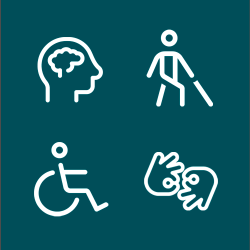Request Accommodations
You are here
Eligibility and implementation of academic accommodations for current College of Western Idaho (CWI) students is an interactive and collaborative process between the student and Student Disability Services.
Eligibility and implementation of academic accommodations for current College of Western Idaho (CWI) students is an interactive and collaborative process between the student and Student Disability Services.
As a student enrolled in classes at CWI, you may request accommodations if:
![]() To review, renew, or request changes to accommodations already in place, visit Renew Accommodations.
To review, renew, or request changes to accommodations already in place, visit Renew Accommodations.
If you have been diagnosed with a disability and wish to request accommodations, please follow the steps outlined below.
The first step to applying for accommodations is to register for classes. View the Registration page for important information, dates, and steps to register.
Once registered for classes, you may request new accommodations by completing an application. The application is used to gather information that will assist Student Disability Services in determining your eligibility for requested accommodations.
Upon submission of your application, medical documentation of your disability will be requested.
Authorization for Release of Protected Health Information
Documentation will be reviewed, and additional documentation may be requested if a more current evaluation is needed.
Once you have completed the application, you will be able to schedule an intake meeting with coordinator. Together, you will review your request for accommodations and discuss next steps.
Following completion of steps 1 through 4, eligible accommodations will be approved by Student Disability Services and implemented in collaboration with your instructor(s). Both the student and the instructor(s) will be notified in writing of the approved accommodation(s). The implementation process may take up to six (6) weeks to complete.
Student Disability Services will determine whether the student is disabled within the definition provided in Section 504 and the ADA. To be disabled under these laws, a person must have a physical or mental impairment that substantially limits one or more major life activity. To be substantially limited by an impairment means the student cannot perform a major life activity the average person in the general population can perform or that the student is significantly restricted in performing that major life activity compared to the average person in the general population.
In making the disability determination, Student Disability Services consider the following:
Disability determinations are generally based on information that the student provides to the College, including detailed and current medical documentation from an appropriate professional regarding the nature and severity of the impairment and a description of the student’s functional limitations. Once complete documentation is received, the College may consult with external medical professionals to review the assessment and any recommended accommodations.
A reasonable accommodation is a modification or adjustment to a course, program, service, job, activity, or facility that enables a qualified student with a disability to have an equal educational opportunity but does not lower or modify essential requirements, fundamentally alter the nature of a service, program or activity, or result in undue financial or administrative burdens.
Once a disability is determined, appropriate academic modifications or adjustments for which the student qualifies will be determined. To determine the appropriateness of particular academic modification or adjustment, Student Disability Services Coordinators and/or the Director of Student Support Services consider:


